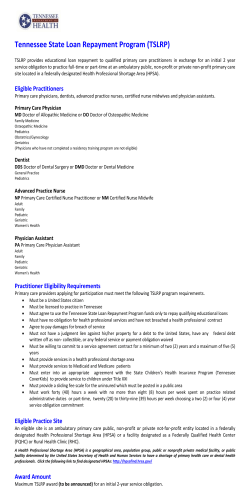
1 Skills Shortage in South Africa :
Skills Shortage in South Africa : “The facts and what is being done? Report compiled by: Francois Calldo Researcher 1 Skills Shortage in South Africa : “The facts and what is being done? “ 1. The current situation: 1.1. There is dispute between those who claim there is no skills shortage and those who says that there is a skills shortage in South Africa. Let’s look at the facts: 1.2. Looking at studies and surveys done: 1.2.1 A number of studies have confirmed that the skills shortage is a real problem in South Africa, and a constraint to economic growth : (a) Research conducted by the international accounting firm Grant Thornton found that 58% of firms surveyed in the medium-to-large sector said that the skills shortage is a particular problem. (b) Accounting firm, Deloite & Touché, released a report in June 2007, indicating that 81% of companies struggles to find appropriate staff, with 76% saying that finding employment equity candidates was a particular problem. The survey noted that there was a particular shortage of : Chartered accountants; IT specialists; Sales and marketing personnel; Scientists. (c) Another study done by the Bureau for Economic research (BER) at the University of Stellenbosch found that 47% of SA manufactures said that the skills shortage was their most serious difficulty. (d) A further study done by the Centre for Development and Enterprises (CDE), specifically mentioned the skills shortage as a specific challenge to do business, and half of the firms had to source skills from abroad. (i) The CDE says that government should ease upon its push for employment equity as it is preventing business from using highly skilled and experienced people and aggravating SA’s skills shortage. 2 (ii) The CDE also said that the skills shortage is worsening because of emigration and the ageing of skilled and experienced staff, their movement into more senior positions and the growing emphasis on employment equity. 1.3. Looking broader than the studies and surveys: 1.3.1. If the above mentioned information is not already refuting the claim that there is no skills shortage, one can also look at the following information: (a) The skills shortage crisis has hit the office of the auditor-general with 700 vacancies for qualified audit managers , and to deal with the shortages currently it is outsourcing work to independent auditing firms. This was reported on the IOL of 17 October 2007. (b) Solidarity itself reported that South Africa only had 10% of the number of artisans that it had 20 years ago, and estimated that the country has a 40% shortage of artisans. (i) Illustrative of the decline in skills, is the fact that in 2006 there were 3 400 apprentices in training in the metals industry, compared to nearly 13 000 in 1982, show figures from the Steel and Engineering Industries Federation of South Africa (Seifsa). This can largely be attributed to the abolition of the apprenticeship system, which was replaced by Sector Education and Training Authority (Seta) learnerships. (ii) Global petrochemicals giant, Sasol, is also working to counter the skills shortage. It is investing in a R140-million skills development programme in order to develop artisans. The money will go directly to the Seta for the chemical industry, the Chemical Industries Education and Training Authority (Chieta), and Chieta-accredited institutions and programmes. (iii) The technical skills shortage in South Africa is further demonstrated by the fact that construction major, Murray & Roberts, is offering a R20 000 sign on bonus for artisans, specifically hydraulic fitters and electricians. If no skills shortage existed such measures would not be necessary. It was also reported in July 2007 that the company had recently re-recruited South African engineers who had moved overseas, to return to their homeland. (c) A crisis in the engineering sector is also looming. (i) South Africa has only one engineer for every 3 200 people, compared to one engineer for every 130 people in China, one engineer for between 250 and 300 people in Europe, and one engineer for 450 people in Australia according to the South African Institution of Civil Engineering (SAICE). (ii) South Africa produces about 1 400 engineering graduates every year, but this needs to be expanded to at least 2 400 to meet the current skills deficit. 3 (iii) The South African Association of Consulting Engineers (Saace) has also added its voice to the skills debate. It conducted a survey in the second half of 2006, and over 90% of firms surveyed revealed that they were looking for engineering personnel. More than 95% of firms said that they were struggling to find engineers and technologists. (d) (i) South Afica is also struggling with its lack of research capacity. Prof. van Jaarsveld from the National Research Foundation (NRF) stated in August 2007 speaking at the Johannesburg Press Club that South Africa needs to produce about 6 000 science and technology PhD graduates per year, in order to ensure that the country stays competitive in the global knowledge economy. South Africa currently produces approximately a fifth of that. (ii) The NRF is not simply bemoaning the lack of research capability in the country, and in 2006 the organisation ploughed R1.5-billion into research, with this figure expected to rise to R3.1-billion in 2008. (e) Within the sphere of education the country is also suffering from a lack of skilled personnel. (i) At a conference in early 2007, Dr. Azar Jammine, chief economist at Econometrix, said it is estimated that South Africa needs 21 000 new teachers each year, but only 5 000 are being produced. (iii) More alarming statistics were found by the Human Sciences Research Council (HSRC), stating in a report that South Africa will have a teacher shortage of 34 000 by 2008. (iv) To combat this skills shortage In September 2007, minister for education, Ms. Naledi Pandor told Parliament that provincial education departments had appointed nearly 1 500 teachers in the past two years, and there were plans afoot to recruit 2 000 more. The minister also added that teachers who had retired or taken “packages” were welcome to return to the profession. (f) The South African government is not sitting idly by while the skills shortage hampers the country’s growth. It is working to ensure that vital skills are developed in the country. The main programme set up to deal with this, is the Joint Initiative on Priority Skills Acquisition (Jipsa), which is part of the Accelerated Shared Growth Initiative for South Africa (Asgisa). Through Jipsa, graduates are placed in positions where they get marketable skill. (g) The following factors are also a contributive factor towards the skills crisis in South Africa” 4 The large scale emigration of South Africans; Government push for employment equity as it is preventing business from using highly skilled and experienced people and aggravating SA’s skills shortage. The growing impact of HIV-AIDS on the supply of skills, especially in key areas such as teaching and nursing, and on productivity levels across the economy. A serious deterioration in education standards at schools, which are plagued by high-drop out rates. As a result, the majority of school leavers are simply not sufficiently qualified in vital disciplines like maths, science and technology. The mismatch in skills is also an aggravating factor towards the skills shortage. What is meant by this is that persons are studying in “soft” degrees, like human resources etc, rather than in engineering. Lastly the “Tight controls“ and protracted delays in the immigration of skilled personnel. (h) Conclusion: (i) There are a number of sectors in the SA economy that experience skills shortages, and it is clear that the skills shortage exists (See attached appendix A for further example). (ii) South Africa is also in a global struggle for skills, with the skills shortage being a global phenomenon. The country needs to make sure that it is competitive in the global hunt for skills, and the first step in doing this would be by acknowledging the problem. Approaching the skills crisis in a manner which racialises or politicises the problem is unproductive at best. (iii) In conclusion, for South Africa to solve the skills crisis, the country needs to scrap racialised employment legislation, make immigration to this country easier and more attractive, especially for skilled foreigners, and challenges facing the country, such as the high levels of crime and poverty need to be tackled immediately. Report compiled by: Francois Calldo Researcher Solidarity Research Department 24 October 2007 5
© Copyright 2026
















